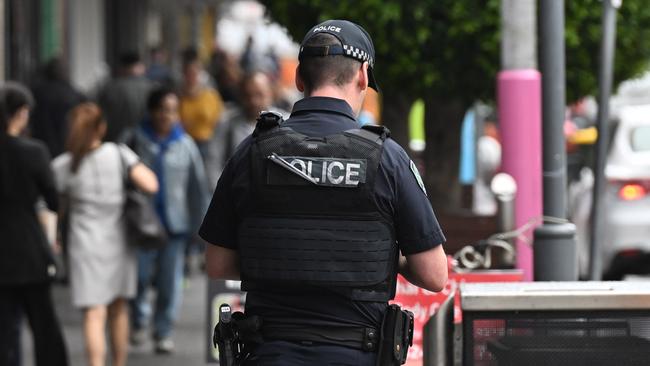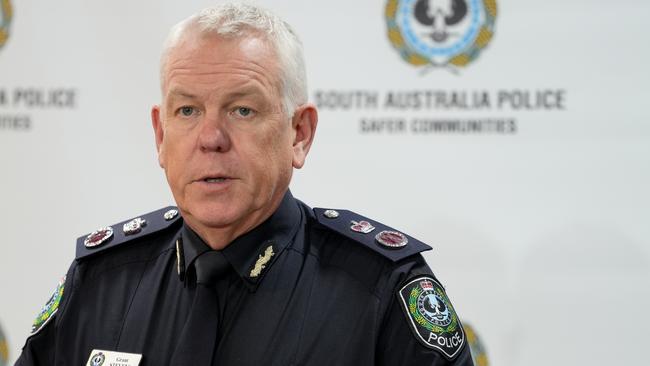Parliamentary inquiry into SA police mental health support services after workers sound alarm bells
A parliamentary committee has heard submissions from police officers and their fight for mental health issues to be recognised by the organisation.
SA News
Don't miss out on the headlines from SA News. Followed categories will be added to My News.
Police have slammed SAPOL’s mental health support system, with one sergeant labelling it “flawed” with officers “inherently mistrustful” of it.
Six verbal submissions to the Select Committee on Support and Mental Health Services were given in parliament, after about 50 submissions were made earlier this year from members of the public.
Speaking to the committee on Wednesday, Sergeant David Pearson said members felt an “inherit mistrust” towards SAPOL’s Employee Assistance Section (EAS), and there was low morale in the force.

Sgt Pearson said joined SAPOL in June 1986 and completed various postings around the state before joining the Major Crash Investigation unit in 2010.
He said he first was diagnosed with PTSD in 1996 following an incident in Murray Bridge, however he didn’t take time off work or seek treatment due to the stigma within the force, as well as not wanting to “show weaknesses”.
Sgt Pearson said he managed to handle his mental health concerns until 2021 when he was diagnosed as suffering PTSD symptoms – which launched a fight over his worker’s claim – that he lodged almost a year later due to his commitment to aiding an ongoing trial.
“I had a trial going through and didn’t go off work finally until December 2022 – and submitted a claim,” he told the committee.
“The claim was supported by my doctor and private psychologist.
“SAPOL appointed a psychiatrist to make an assessment and he supported the diagnosis and gave a very guarded opinion as to my ability to return to work.”
However, Sgt Pearson said the claim was officially rejected in June 2023, which forced him to take the matter to a tribunal until eventually SAPOL conceded.
Since then, EAS contacted him once and left it up to him to request any follow-up sessions.
Sgt Pearson said the EAS was “flawed”, making it incapable of effectively serving police members.
“The employee assistance program they offer is flawed through having, firstly, a limited number (of employees). It takes time to build rapport with a psychologist,” he said.
“The other problem is there is an inherent mistrust of them (the EAS).
“They are linked to SAPOL and SAPOL have had instances of confidential information exchange that they have admitted to.”
Commissioner Grant Stevens refuted claims of privacy breaches between SAPOL and the EAS when he addressed the select committee in March of this year.

“It is a confidential service and we do not have access to their files,” he said.
“I am not aware of any feedback that would indicate that there are officers who don’t have confidence in the service based on the perception that it’s not confidential.
“We put a great deal of effort into ensuring people understand the service is available, it is completely confidential and they have access to those six sessions.”
Mr Stevens later wrote to the committee, after taking a question on notice, that a SAPOL employee’s EAS medical records were accessed once during a Police Disciplinary Tribunal, at the request of the employee’s lawyer.
Sgt Pearson also said he believes SAPOL still suffers from stigma around mental health.
“The nature of policing (is) volatile and unpredictable,” he said.
“There needs to be support structures in there and it needs to be defined so that it is not marginalised all the time.
“If you have a problem, you can go and get something done about it without fear of being tagged or moved or ostracised.
“Being able to put your hand up and say you’ve got an issue and be taken seriously
and be given some sort of opportunity to have some treatment, talk to somebody about it, deal with it and not be stigmatised within the workplace would be a massive leap forward.”
Amid EAS problems, Sgt Pearson said SAPOL is dealing with low morale.
“Morale is at a very low point,” he said. “The general theme is that management is out of touch with frontline officers and the members don’t feel valued and supported.
“I am at the end of my policing career. I wouldn’t like to be starting it.”




